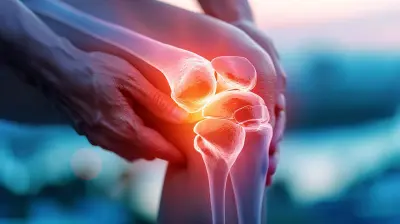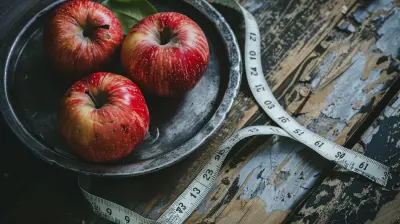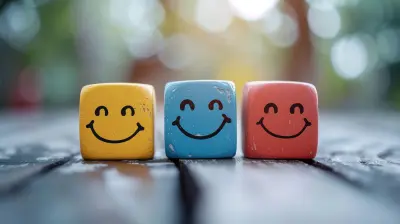Fasting for Fitness: Can Intermittent Fasting Enhance Recovery?
29 May 2025
Intermittent fasting has been buzzing all over the health and fitness world lately. If you’ve ever skipped breakfast and felt like a superhero during your workout, you’re not alone. The idea of fasting for gains might sound like a paradox—like eating your cake and … well, not eating it. But the truth? Intermittent fasting (IF) might not just help you lose fat or manage your calories but could also play a surprising role in muscle recovery and overall fitness performance.
Let’s be real—when we talk about exercise recovery, we usually think protein shakes, stretching, ice baths… not skipping meals. So, can fasting really help you bounce back faster after a killer session at the gym? Or will you just end up tired and sore with nothing to show for it?
Let’s dig deep and get curious!
What is Intermittent Fasting, Really?
First things first—intermittent fasting isn’t a diet in the traditional sense. It’s not about what you eat, but when you eat.There are various ways to do it:
- 16:8 Method: Fast for 16 hours and eat all your meals during an 8-hour window.
- 5:2 Approach: Eat normally for 5 days and restrict calories (around 500–600) for 2 days.
- OMAD (One Meal A Day): Yep, just one big meal per day.
- Alternate Day Fasting: You guessed it—eat one day, fast the next (or eat very little on fast days).
Now, the idea isn’t just to starve yourself but to give your body time away from constant digestion to reset, repair, and rejuvenate.
Recovery 101: Why It Matters
Before we connect the dots between fasting and recovery, let’s talk about what recovery actually is.When you train—whether it’s cardio, lifting weights, or just a bootcamp class—you’re essentially breaking your body down. You create tiny tears in your muscles, deplete energy stores, and ramp up inflammation. But here’s the secret: The magic happens during recovery, not the workout itself.
Recovery helps to:
- Repair muscle tissues
- Rebuild glycogen stores
- Balance hormones like cortisol and testosterone
- Reduce inflammation
- Improve sleep and mental focus
So, yeah. It's kind of a big deal.
Does Fasting Help or Hurt Recovery?
Okay, now to the big question: Can intermittent fasting actually improve recovery?The answer is… it depends. Yeah, not the clean-cut answer you'd love, but bear with me.
Let’s look at both sides.
🔬 The Science Behind Fasting & Recovery
Here’s what researchers and science nerds are finding out when it comes to fasting:1. Boosting Human Growth Hormone (HGH)
When you fast, your body increases the production of human growth hormone (HGH)—a key player in muscle repair and fat metabolism. Some studies show fasting can increase HGH by up to 5x! That's massive.More HGH = better muscle recovery and growth. So while you’re fasting, your body may be silently doing some serious muscle maintenance.
2. Lowering Inflammation
Chronic inflammation is the enemy of recovery. It slows healing and messes with muscle performance. Fasting reduces oxidative stress and inflammation markers like CRP, which might help your body chill out and recover more efficiently.3. Enhanced Insulin Sensitivity
Fasting helps regulate blood sugar and improves insulin sensitivity—great news for energy management. Better insulin sensitivity means your muscles can absorb nutrients more effectively post-meal, fueling faster repair.4. Cellular Repair (Autophagy)
Here’s where it gets sci-fi. Fasting triggers a process called autophagy—a cellular clean-up crew that breaks down damaged cells and recycles them.Think of it like decluttering your garage. Your body gets rid of the junk and uses those salvaged parts to rebuild stronger tissue. Muscle recovery, immune function, and even mental clarity can benefit from autophagy.
🚧 Potential Downsides of Fasting and Recovery
Alright, it’s not all sunshine and shredded six-packs. Fasting has some potential drawbacks if you're not careful.1. Nutrient Timing Gets Tricky
Recovery thrives on the right nutrients delivered at the right time—especially protein and carbs post-workout. If your fasting window closes before your training ends, it might be tough to get what your body needs.So if you’re doing a heavy strength session while fasted, and then delaying nutrition for hours afterward… yeah, you might be missing out on gains.
2. Low Energy and Performance Dips
Early morning fasted workouts can feel like you're running on fumes. Ever tried sprinting when you haven’t eaten since dinner? Tough gig.And if energy is low, you’re less likely to push hard during workouts—which affects how much recovery you’ll need in the first place.
3. Not for Everyone
Let’s keep it real—fasting isn’t a one-size-fits-all solution. Some people feel amazing, others feel hangry and sluggish. If you’re training intensely or multiple times per day, fasting might leave you under-fueled and over-fatigued.Listen to your body—it knows best.
How to Combine Fasting with Fitness Recovery
So, is there a way to harness the benefits of fasting without sabotaging your recovery? Yup, but you’ve gotta be strategic.Here are some practical tips:
1. Time Your Workouts Smartly
Try to exercise toward the end of your fasting window, so you can eat right after. This lets you stay fasted for autophagy and HGH benefits and get your recovery nutrients in right after training.Example: Fast from 8 PM to 12 PM. Workout at 11:30 AM. Eat your first meal post-workout at noon.
Boom. Best of both worlds.
2. Prioritize Protein and Carbs
Recovery isn't just about eating—it's about eating right. Make your post-fast meal protein-packed (think chicken, eggs, lentils) and include healthy carbs (like sweet potatoes or rice) to replenish glycogen.Protein shakes are fine, but whole foods win for long-term results.
3. Hydrate Like a Beast
Fasting can dehydrate you, especially if you’re training during the fast. Drink loads of water, and consider adding electrolytes or Himalayan salt to help with mineral balance.Cramps and fatigue? Often just dehydration in disguise.
4. Track and Adjust
Everyone reacts differently to fasting. Track how you feel—energy-wise, performance-wise, and recovery-wise. If you're not bouncing back, try shorter fasting windows or eat more nutrient-dense meals during your feeding period.Who Should Try Intermittent Fasting for Recovery?
Good candidates for experimenting with IF & fitness:- Casual gym-goers
- People aiming for fat loss without sacrificing recovery
- Endurance athletes (during off-peak training)
- Anyone looking to improve metabolic health
But who should go slow or skip it altogether?
- High-intensity strength athletes on a tight training schedule
- Teens or people with disordered eating history
- Pregnant or breastfeeding moms
- People with certain medical conditions (always talk to your doc first)
Real Talk: What I’ve Noticed with IF and Recovery
Personally, when I first tried intermittent fasting, I worried my workouts would suffer. But surprise—I actually felt lighter, more focused, and less bloated. Recovery-wise? I noticed less DOMS (Delayed Onset Muscle Soreness), especially after fasted morning workouts followed by a solid meal.But here’s the catch—I had to tweak my routine. I shortened my fasting window from 18 hours to 14. I also bumped up my protein and made sure to stretch and sleep like a boss.
Bottom line? Fasting isn’t magic, but it can be a powerful tool when used wisely.
Final Thoughts: Is Fasting the Secret Sauce for Recovery?
So, back to our original question: Can intermittent fasting enhance recovery?Yes—and no.
It has some promising perks: boosted HGH, reduced inflammation, cellular clean-up, and improved insulin sensitivity. But if done wrong, you could risk underfueling your body, making things worse instead of better.
Like any tool, it’s all about how you use it. Think of intermittent fasting as the seasoning—not the main dish—of your fitness journey. Pair it with smart training, proper nutrition, and solid rest, and you could be unlocking a whole new level of wellness and recovery.
So, are you going to give fasting for fitness a shot?
Try it, tweak it, and see how your body responds. Because at the end of the day, your body is your best coach.
all images in this post were generated using AI tools
Category:
Intermittent FastingAuthor:

Laurie Barlow
Discussion
rate this article
3 comments
Lark Barker
Embrace the power of intermittent fasting! It’s not just a diet; it's a lifestyle that can boost your recovery and enhance your fitness journey. Listen to your body, stay consistent, and watch how your strength and resilience soar. Keep pushing forward!
June 16, 2025 at 4:52 AM

Laurie Barlow
Thank you for sharing your insights! Intermittent fasting can indeed be a powerful tool for enhancing recovery and supporting fitness goals. Listening to your body and staying consistent are key to success on this journey. Keep up the great work!
Sheena Heath
Great article! Intermittent fasting can be a powerful tool for enhancing recovery, but it’s essential to listen to your body and find what works best for you. Remember, balance is key! Stay patient and consistent, and you’ll likely see positive changes in your fitness journey. Keep going!
June 2, 2025 at 2:35 AM

Laurie Barlow
Thank you! I completely agree—finding balance and listening to your body are crucial for effective recovery. Appreciate your insights!
Tamara Schultz
Embrace the pause, let time weave strength into your recovery.
May 30, 2025 at 3:10 AM

Laurie Barlow
Thank you! Embracing pauses can indeed enhance recovery, allowing our bodies to rebuild and strengthen effectively.



